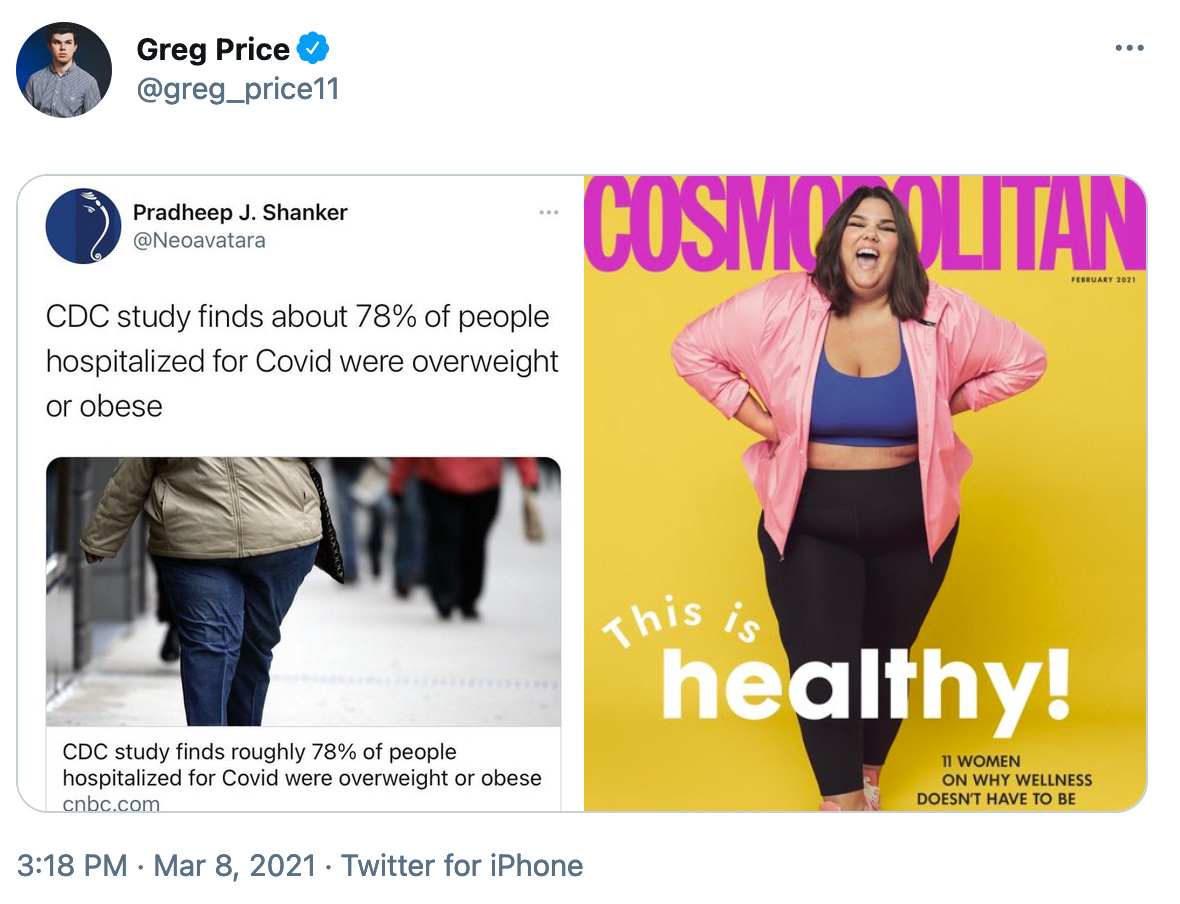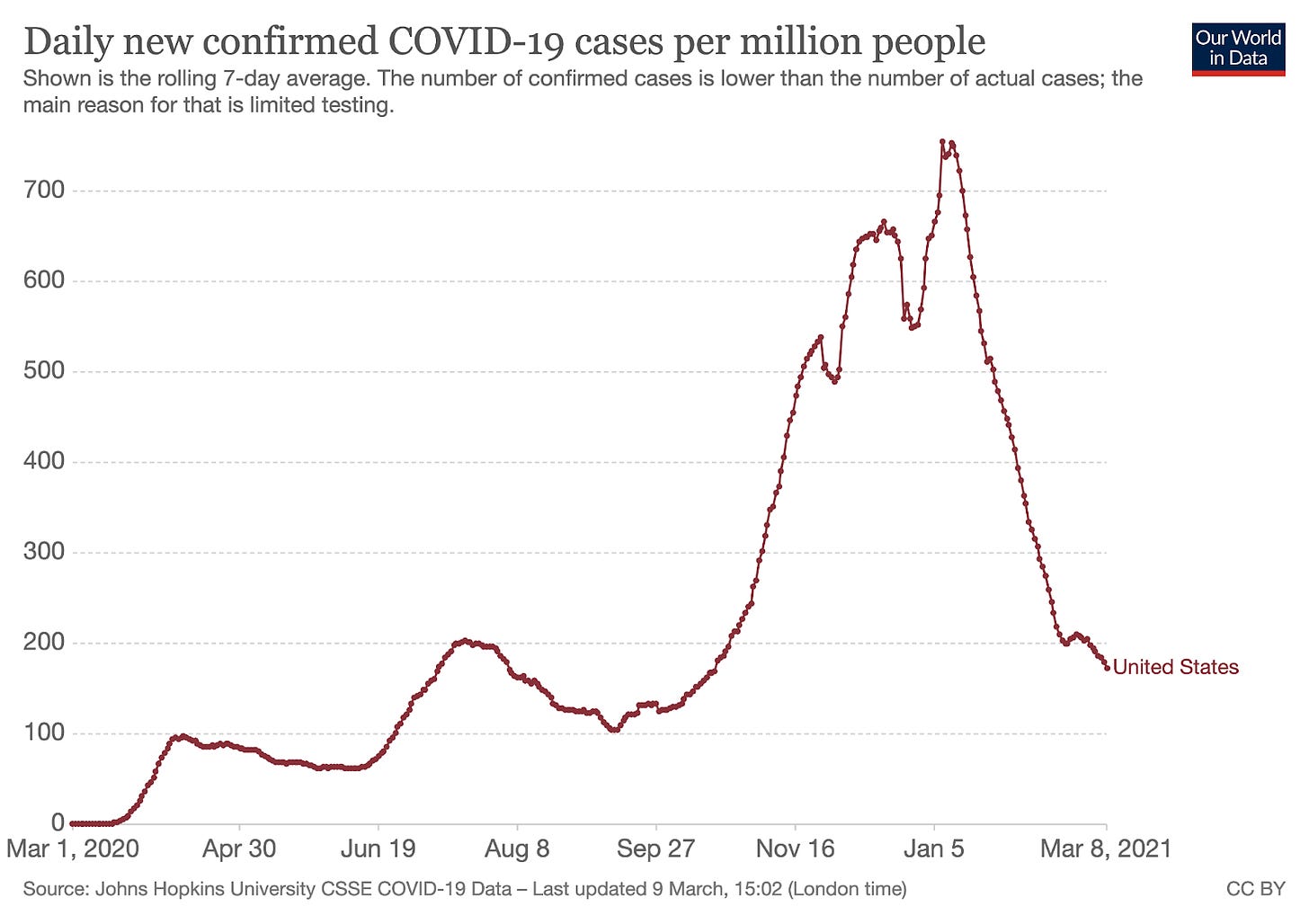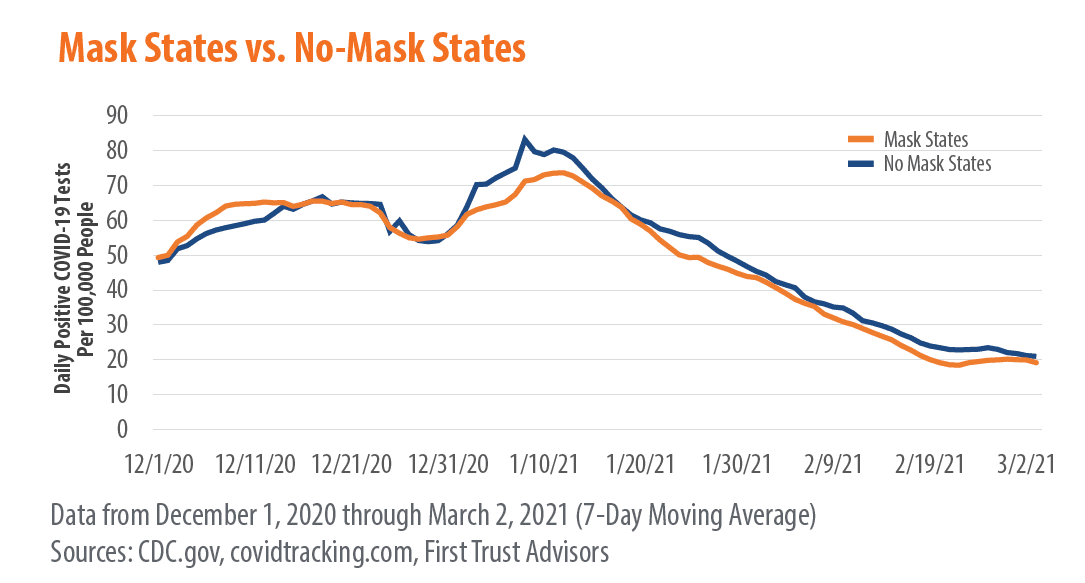More States Freed. Cases Still Falling. More Calls for Accountability.
The national COVID daily case count continues its downward slope. Meanwhile, Arizona Governor Doug Ducey has lifted capacity restrictions on state businesses including gyms, restaurants, theaters, water parks, bowling alleys, and bars with dine-in services.
Wyoming will follow suit in lifting its mask mandate and COVID restrictions next week.
A WHO team investigating the origins of COVID scraped its interim report on its recent mission to China amid mounting tensions between Beijing and Washington over the investigation. Furthermore, a group of prominent international scientists called for a new probe.
In other news:
When we look back on 2020, COVID will not be the story. The story will be how we reacted to COVID-19, how we took a disease that was at most twice as bad as our worst recent flu season and doubled its lethality through panic, says our Karl Dierenbach.
Liberals and their public health friends don’t seem to want the pandemic to end—ever—as the lockdown lobby persists despite the vaccine rollout, writes the Wall Street Journal Editorial Board.
What’s needed is an independent, multidisciplinary and unfettered investigation into the origins of the outbreak, both the zoonotic and laboratory hypotheses, says The Washington Post Editorial Board.
The Wuhan lab's research on bat viruses drew the attention of U.S. diplomats and officials at the Beijing Embassy in late 2017, prompting them to alert Washington. But their cables were ignored.
Free-marketeers should make their case with renewed vigor after central planners’ pandemic missteps, says Tim Rice in City Journal.
New study by Drs. Jay Bhattacharya and John Ioannidis: Mandatory stay-at-home and business closures had no significant benefits reducing the spread of COVID.
British students are returning to school today for the first time in two months.
Want to support our work? Visit our Substack page and leave us a tip.
On Rational Ground for our premium members, our data analyses will always be available to you. Interested in becoming a COVID expert?
COVID News
U.S. Coronavirus Cases Post Slowest Spread Since Pandemic Began
With the U.S. vaccination effort picking up speed, new coronavirus cases in the U.S. rose 1.5% in the week ended Sunday, the slowest increase since the pandemic began almost a year ago.
The U.S. reported 420,285 infections for the week, after recording 471,198 cases in the prior seven days, according to data compiled by Johns Hopkins University and Bloomberg. The percentage gain was the smallest since Bloomberg began tracking cases in January 2020.
In the past week, an average of 2.16 million vaccine doses per day were administered in the U.S., with the total number of shots reaching 90.4 million, according to the Bloomberg Vaccine Tracker.
Arizona Gov. Ducey lifts capacity limits businesses, restaurants, gyms and water parks
PHOENIX — Restaurants, gyms, movie theaters, bowling alleys, water parks and bars that serve food for dine-in can immediately open at 100% capacity, Arizona Gov. Doug Ducey announced Friday, lifting one of the state's mitigation strategies amid the ongoing COVID-19 pandemic.
However, businesses will have to enforce social distancing, mask requirements, increased cleanings, and continue to follow the CDC-recommended guidelines.
"Today’s announcement is a measured approach; we are not in the clear yet. We need to continue practicing personal responsibility. Wear a mask. Social distance. Stay home when you’re sick and wash your hands frequently," Gov. Ducey said in a prepared statement.
The executive order also prevents mayors and local jurisdictions from issuing "extreme" orders that would shut down businesses, the Governor's Office said in a news release announcing the executive order.
Wyoming will lift mask mandate next week
Wyoming will lift its mask mandate next week, Gov. Mark Gordon’s office announced Monday. The state will also allow bars, restaurants, theaters and gyms to resume normal operations on Tuesday after nearly a year of working under restrictions meant to limit COVID-19’s spread.
The news comes a week after new, loosened health orders went into effect removing limits on personal care businesses such as salons and widening allowable public gatherings.
“I thank the people of Wyoming for their commitment to keeping one another safe throughout this pandemic,” Gordon said in a statement. “It is through their efforts that we have kept our schools and businesses operating and our economy moving forward. I ask all Wyoming citizens to continue to take personal responsibility for their actions and stay diligent as we look ahead to the warmer months and to the safe resumption of our traditional spring and summer activities.”
The changes to the state’s health orders will be shared later this week, but Gordon “wanted to make sure the public knew of this important change today,” the announcement said.
“Wyoming is one of the few states in the country that kept students learning in the classroom for the entire school year,” Gordon said in the news release. “We made sacrifices, but the earlier orders saved lives. We persevered. With this approach we can have graduations, proms and a great end to the school year by keeping schools open. Especially since our children will not have the chance to be vaccinated this spring.”
WHO Investigators to Scrap Plans for Interim Report on Probe of Covid-19 Origins
BEIJING—A World Health Organization team investigating the origins of Covid-19 is planning to scrap an interim report on its recent mission to China amid mounting tensions between Beijing and Washington over the investigation and an appeal from one international group of scientists for a new probe.
The group of two dozen scientists is calling in an open letter on Thursday for a new international inquiry. They say the WHO team that last month completed a mission to Wuhan—the Chinese city where the first known cases were found—had insufficient access to adequately investigate possible sources of the new coronavirus, including whether it slipped from a laboratory.
Their appeal comes as the U.S.—which recently reversed a decision to leave the WHO—lobbies for greater transparency in the investigation, saying it is waiting to scrutinize the report on the Wuhan mission, and urging China to release all relevant data, including on the first confirmed infections in December 2019, and potential earlier ones.
Beijing, meanwhile, is pressing for similar WHO-led missions to other countries, including the U.S., to investigate whether the virus could have originated outside China and spread to Wuhan via frozen food packaging.
Will the U.S. have Covid vaccine doses for everyone by the end of May? Probably
President Biden confidently declared last week that there would be enough Covid-19 vaccine delivered to the U.S. government by the end of May to vaccinate every American.
But predictions about vaccine availability have repeatedly been proven wrong. How confident should Americans be this time? The short answer: somewhat.
There is no doubt that the U.S. is moving from a time of vaccine scarcity, when there is not enough vaccine to go around, to one of vaccine surplus, when it will be far easier for people who want a Covid vaccine to receive one. By early summer, barring a manufacturing catastrophe, there should be enough vaccine for every American.
Commentary/Analysis
COVID is not a hoax, but the numbers are: A look at the first flu season with COVID
COVID-19 is equivalent to a bad flu. This has been said often over the past year and for good reason: People hear stories about a motorcycle crash victim being declared a COVID-19 death, and they feel COVID-19 may be over-counted. They hear stories of seniors quickly deteriorating and dying of loneliness, and they suspect many excess deaths may not have been directly caused by COVID-19.
We have spent years looking for an end-of-days pandemic, and, not finding one, we decided to manufacture our own. In fact, we could have done this for any bad flu season (I’ll show how later), but we chose 2020. Perhaps it is human nature that when things are going well, we look for an exit.
To be clear, COVID-19 is not a hoax. It is real and it causes real-world damage and real-world heartbreak, but it is not the killer it has been made out to be. Also, the medical profession has performed admirably with respect to direct care of patients. They learned from mistakes early on and developed treatments and protocols that have steadily reduced the deadliness of COVID-19. The speed at which vaccines have been developed is truly amazing.
Conversely, the public health response to COVID-19 has been an abysmal failure. At every turn, the effects and danger of COVID-19 have been exaggerated, and the collateral damage of government mandates and government- and media-induced panic has been swept under the rug. Official after official has turned a blind eye to once-accepted standards only to follow the virtue signaling, have-to-do-something crowd. The worst example of this tendency was last summer, when public health officials condoned mass protests as public health events.
The Perpetual Covid Crisis
https://www.wsj.com/articles/the-perpetual-covid-crisis-11614902148
President Biden’s announcement this week that the U.S. should have enough vaccines to inoculate every adult American by the end of May brought hope of a return to normalcy. This apparently is prehistoric thinking.
“The last thing we need is Neanderthal thinking,” Mr. Biden said Wednesday after Texas Gov. Greg Abbott lifted his statewide mask mandate and restrictions on businesses. Democrats are applauding Mr. Biden, but imagine if Donald Trump had attacked Michigan Gov. Gretchen Whitmer’s lockdown as “Neanderthal thinking.”
Vaccination rates in Texas and other states have been increasing while hospitalizations are plunging. About one in five adults in Texas has received at least one dose of the Pfizer or Moderna vaccine. Most are seniors and people with health conditions who are at highest risk of severe illness. Hospitalizations in Texas have fallen more than 60% since a mid-January peak.
Politicians created a box canyon with lockdowns last spring that were originally intended to “flatten the curve.” But then every time governors loosened restrictions and cases ticked up, Democrats would demand lockdowns. Not that lockdowns (or mask mandates) much helped California or New York, which experienced bigger surges this winter than Florida did with neither.
Vaccines were supposed to enable Americans more or less to get back to their before-Covid lives—youth sports, eating out, family gatherings, and even walking outside without a mask. It’s probably still prudent to wear masks in public settings indoors for a few more months, and businesses like Starbucks and Target plan to continue requiring them.
In 2018, Diplomats Warned of Risky Coronavirus Experiments in a Wuhan Lab. No One Listened.
On January 15, in its last days, President Donald Trump’s State Department put out a statement with serious claims about the origins of the Covid-19 pandemic. The statement said the U.S. intelligence community had evidence that several researchers at the Wuhan Institute of Virology laboratory were sick with Covid-like symptoms in autumn 2019—implying the Chinese government had hidden crucial information about the outbreak for months—and that the WIV lab, despite “presenting itself as a civilian institution,” was conducting secret research projects with the Chinese military. The State Department alleged a Chinese government cover-up and asserted that “Beijing continues today to withhold vital information that scientists need to protect the world from this deadly virus, and the next one.”
The exact origin of the new coronavirus remains a mystery to this day, but the search for answers is not just about assigning blame. Unless the source is located, the true path of the virus can’t be traced, and scientists can’t properly study the best ways to prevent future outbreaks.
The original Chinese government story, that the pandemic spread from a seafood market in Wuhan, was the first and therefore most widely accepted theory. But cracks in that theory slowly emerged throughout the late winter and spring of 2020. The first known case of Covid-19 in Wuhan, it was revealed in February, had no connection to the market. The Chinese government closed the market in January and sanitized it before proper samples could be taken. It wouldn’t be until May that the Chinese Centers for Disease Control disavowed the market theory, admitting it had no idea how the outbreak began, but by then it had become the story of record, in China and internationally.
The WHO needs to start over in investigating the origins of the coronavirus
MORE THAN a year after the coronavirus pandemic began, its origins are mysterious. The truth may take years to discover, but now is a good time to relaunch the search for it. A joint inquiry by the World Health Organization and China has run into trouble, as a group of 26 scientists pointed out this week in an open letter to the WHO. Both the possibility of a zoonotic spillover from animal hosts and that of a laboratory accident need independent, expert investigation — and it is time for a new team to seriously tackle the laboratory hypothesis.
Why is the issue of the virus origins so important? Because the source and method by which the virus made the leap to people are critical to prepare for any future pandemic. Too much political heat has already been spent on this issue, some generated by China, where the first major outbreak began, and some by Donald Trump in his attempt to distract attention from his catastrophic pandemic response as president. The blame-throwing must not impede finding the truth.
The WHO-China investigation team, focused on zoonotic spillover, is writing a report, which the director general of the WHO, Tedros Adhanom Ghebreyesus, says will be released the week of March 15.
Paging Dr. Hayek
https://www.city-journal.org/hayek-covid-19-lessons
Free-market advocates have responded to the Covid-19 pandemic relatively quietly. They should speak up. The pandemic and its fallout show the virtues of market forces while revealing the dangers of relying on bureaucratic central planners and shortsighted regulations.
An opposition to central planning grounded in the understanding that we can’t predict the future, a healthy skepticism of bureaucrats and experts who fancy themselves philosopher-kings, an awareness of the dangers of outdated and unnecessary regulations: these are the tenets of free-market thinking as espoused by the patron saint of libertarians, Friedrich Hayek. America’s response to Covid-19 reinforces their wisdom, and conservatives should take note.
The tension between adaptive individuals and misguided experts was on display in the pandemic’s early months. In February 2020, Surgeon General Jerome Adams was one of many public-health experts who discouraged Americans from wearing masks, asserting: “They are NOT effective in preventing [the] general public from catching” Covid-19. Yet common sense dictates that masks keep things off your face. It makes sense that a worried citizenry, faced with a microscopic foe, would take to wearing masks. It also makes sense that public-health experts like Adams wanted to preserve the supply of N95 masks for health-care providers. He could have said as much: “You can wear a kerchief if you want, but please leave the heavy-duty masks to the frontline workers.” Instead, public-health experts insisted that masks were ineffective, then revised their position, and have since called for double masking.
Research
Assessing mandatory stay-at-home and business closure effects on the spread of COVID-19
https://pubmed.ncbi.nlm.nih.gov/33400268/
Abstract
Background and aims: The most restrictive nonpharmaceutical interventions (NPIs) for controlling the spread of COVID-19 are mandatory stay-at-home and business closures. Given the consequences of these policies, it is important to assess their effects. We evaluate the effects on epidemic case growth of more restrictive NPIs (mrNPIs), above and beyond those of less-restrictive NPIs (lrNPIs).
Methods: We first estimate COVID-19 case growth in relation to any NPI implementation in subnational regions of 10 countries: England, France, Germany, Iran, Italy, Netherlands, Spain, South Korea, Sweden and the United States. Using first-difference models with fixed effects, we isolate the effects of mrNPIs by subtracting the combined effects of lrNPIs and epidemic dynamics from all NPIs. We use case growth in Sweden and South Korea, 2 countries that did not implement mandatory stay-at-home and business closures, as comparison countries for the other 8 countries (16 total comparisons).
Results: Implementing any NPIs was associated with significant reductions in case growth in 9 out of 10 study countries, including South Korea and Sweden that implemented only lrNPIs (Spain had a nonsignificant effect). After subtracting the epidemic and lrNPI effects, we find no clear, significant beneficial effect of mrNPIs on case growth in any country. In France, for example, the effect of mrNPIs was +7% (95% CI: -5%-19%) when compared with Sweden and + 13% (-12%-38%) when compared with South Korea (positive means pro-contagion). The 95% confidence intervals excluded 30% declines in all 16 comparisons and 15% declines in 11/16 comparisons.
Conclusions: While small benefits cannot be excluded, we do not find significant benefits on case growth of more restrictive NPIs. Similar reductions in case growth may be achievable with less-restrictive interventions.
Charts and Graphics
International News
UK schools to reopen, backed by frequent virus testing
LONDON (AP) — British students, backed by a robust coronavirus testing program, are gearing up to return to school Monday after a two-month closure, in what Prime Minister Boris Johnson says is a plan to get the country “moving closer to a sense of normality.”
The reopening of schools is the first step in the U.K. government’s plan to gradually ease COVID-19 restrictions as the country’s vaccination drive gains critical mass, with all restrictions lifted by June.
As part of the plan, millions of high school and college students coming back to U.K. classrooms will be tested for the virus for the first few weeks. Authorities want to quickly detect and isolate asymptomatic cases in order to avoid sending entire schools home.
“We are being cautious in our approach so that we do not undo the progress we have made so far,” Johnson said in a statement, urging everyone who is eligible to get vaccinated.






